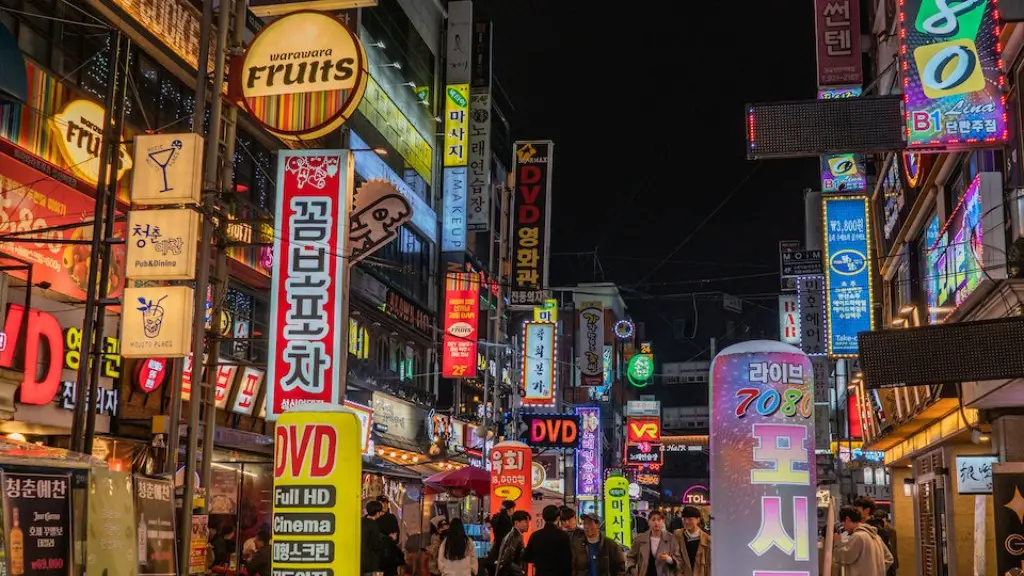Background Information
North Korea is a totalitarian state located in East Asia and is officially referred to as the Democratic People’s Republic of Korea. It is best known for its closed society and government, nuclear weapons ambitions and status as an international pariah. The country has a long and troubled history, starting with its creation after the Second World War and continued through multiple conflicts and the death of its first leader, Kim Il-Sung. North Korea has endured decades of political and economic isolation and is now regarded as a rogue state by both the United States and the United Nations.
Relevant Data
The country is plagued by poverty and food insecurity, with an estimated 40% of the population living in extreme poverty and an annual per capita GDP of US$ 1,800, making it one of the poorest countries in the world. North Korea has been under international sanctions since 2006 and is heavily dependent on foreign aid and trade. The country has a sizeable military, with an estimated 1.2 million active personnel and 5.6 million reserve personnel. It is estimated that North Korea currently possesses an estimated 10-16 nuclear warheads, though the exact number remains unknown.
Expert Perspectives
Experts have long debated the potential impact that North Korea’s nuclear weapons technology could have on the region and the rest of the world. Some have argued that North Korea’s nuclear weapons are primarily symbolic, and are intended to show the world its power and influence, while others have argued that they could be used as a credible means of deterrence or as a resolute way to ensure its security.
In response to North Korea’s nuclear ambitions, regional powers such as China, Japan and South Korea have sought to pressure the country economically and diplomatically. The United Nations has also imposed multiple sets of sanctions on the country and has called on it to cease its nuclear weapons program. However, North Korea has consistently refused to do so, arguing that its nuclear weapons program is essential for its national security and sovereignty.
Analysis
The question then remains: is North Korea all talk? It is clear that North Korea is a dangerous and unpredictable state, and its nuclear weapons program is a source of great concern for its neighbors and the international community. North Korea’s refusal to yield to international pressure shows that it is serious about its nuclear ambitions. However, its nuclear technology remains rudimentary and the international sanctions imposed on it have had an effect on its economy. Therefore, it is possible that North Korea may be bluffing in order to preserve its national security and to show the world its power and influence.
Global Implications
North Korea’s nuclear weapons program is a major source of concern for the global community. The possibility that a rogue state possesses active nuclear weapons is a frightening prospect, particularly when the leader of said state is unpredictable and has a reputation of arrogance and threatening behavior. The global community is deeply concerned with North Korea’s efforts to obtain nuclear technology and the possibility that such technology could be sold to other hostile states or terrorist groups.
Geopolitical Impact
North Korea’s nuclear weapons program has created an unprecedented level of geopolitical uncertainty in the region. All of North Korea’s neighbours have both denounced the country’s nuclear ambitions and sought to safeguard their own borders from any North Korean aggression. China and South Korea have maintained diplomatic relations with the country and have sought to use economic incentives to encourage North Korea to abandon its nuclear ambitions. Japan, on the other hand, has been much more wary of North Korea and has used a more hardline approach to dealing with the country.
Military Posturing
North Korea has consistently used military posturing and aggressive rhetoric as a means of flexing its muscles and showing the world its power. The country has conducted multiple nuclear and missile tests in an effort to show the world that it can defend itself if necessary. It has made multiple threats to its neighbours, such as Japan and South Korea, and has issued bellicose rhetoric about its intentions to use force if necessary. This in turn has created a high level of tension in the region and fuelled fears of a potential conflict.
International Politics
North Korea’s nuclear weapons program has also been a major factor in international politics. The United States has been steadfast in its opposition to North Korea’s nuclear ambitions and has sought to isolate and pressure the country through a variety of diplomatic and economic means. Other countries such as China, Russia and South Korea have taken a more nuanced approach to dealing with North Korea and have sought to use economic incentives in an effort to entice the country to abandon its nuclear ambitions. The international community remains divided on the best approach to dealing with North Korea and its nuclear program.
Economic Incentives
North Korea is heavily dependent on foreign aid and trade and is financially vulnerable, which has been used as a potent leverage in attempting to alter its course. International aid and economic sanctions have been used as a means of coercing North Korea into abandoning its nuclear ambitions, and have had some success in doing so. In addition, North Korea has made moves to open up its economy, albeit slowly, and has engaged in diplomatic negotiations with its neighbours in an effort to bring about peace and stability.
The Future of North Korea’s Nuclear Program
North Korea’s nuclear ambitions have been a source of concern for the global community for decades. The situation appears to be at a stalemate, as North Korea continues to refuse to give up its nuclear weapons program and the international community remains divided on how to approach the situation. It is likely that North Korea will continue to use its nuclear weapons as a means of asserting its power and influence in the region, and the international community will continue to search for a way to peacefully resolve the situation.


